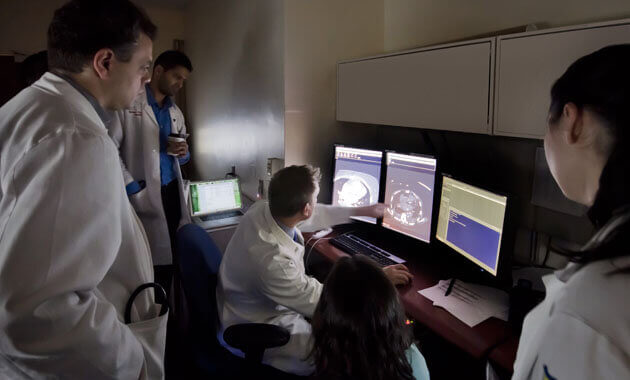Mammography and CT Lung Cancer Screening Can Improve Population-Based Health Outcomes

Recent studies have supported a recommendation by the UC San Francisco Department of Radiology and Biomedical Imaging that annual mammography screening start at age 40 for women of low or average risk. But mammography can also lead to another health benefit—an opportunity for women to receive lung cancer screening (and smoking cessation counseling), if eligible.
At RSNA 2018, the 104th Scientific Assembly and Annual Meeting for the Radiological Society of North America, researchers from Harvard Medical School presented an analysis of data from the 2015 National Health Interview Survey (NHIS). This survey looked at 5,436 women between ages 55 and 74—an age range that reflects an overlap in guidelines from the U.S. Preventative Services Task Force (USPSTF) for both breast cancer and lung cancer screening. Diego Lopez, one of the presenters, shared their findings with Aunt Minnie. Overall, they found that 68 percent of women surveyed had a screening mammogram, and of those, 7.6 percent were also eligible for lung cancer screening (a total of 1.74 million women nationwide). However, of those who were eligible for lung cancer screening, 92.5 percent did not receive the screening, even though they were eligible.
CT lung cancer screening can detect lung cancer in at-risk patients at its earliest stage, when the disease is potentially more treatable and curable. However, studies like this one and another analysis done by the American Society of Clinical Oncology (ASCO) find that only small percentages of those eligible actually get screened. At UCSF Radiology, we support recommendations made by the USPTF that adults ages 55 to 80 with a 30 pack-year smoking history receive CT lung cancer screening.
Lopez believes that radiology can make a difference here and points to an opportunity for radiologists to partner with primary care physicians (PCPs) to "improve population-based imaging." Both Bonnie Joe, MD, PhD, chief of Breast Imaging, and Brett Elicker, MD, chief of Cardiac and Pulmonary Imaging, agree that dialogue between PCPs and radiologists is important along with patient awareness surrounding the benefits of CT lung cancer screening and screening eligibility. Overall, this (along with smoking cessation counseling) could improve population-based health outcomes.
